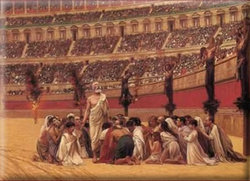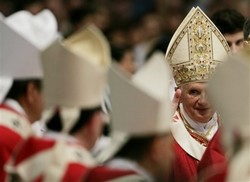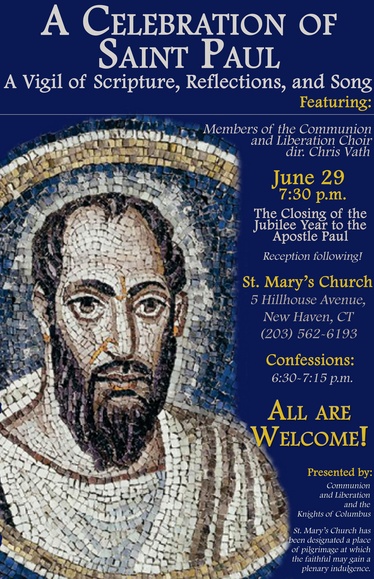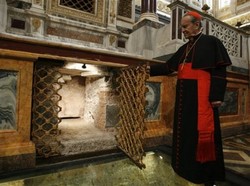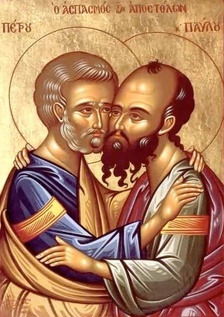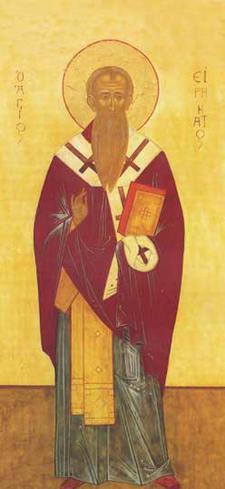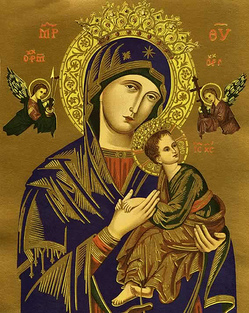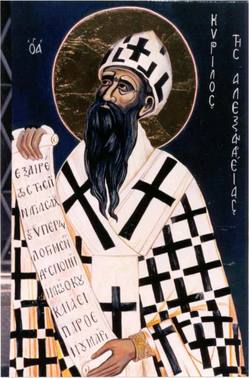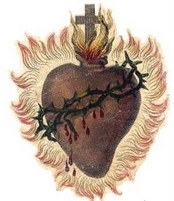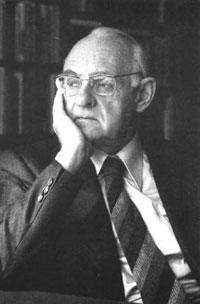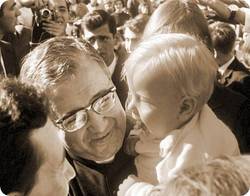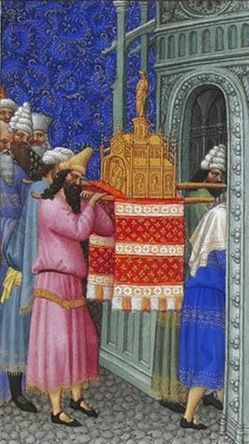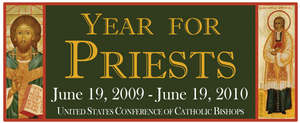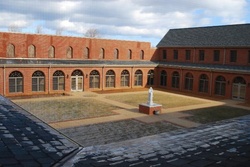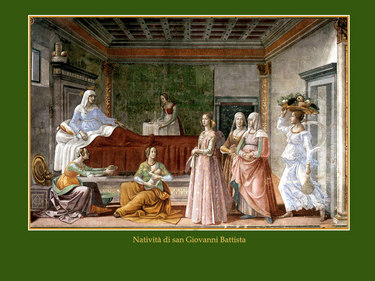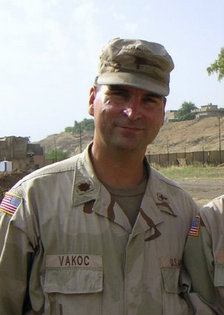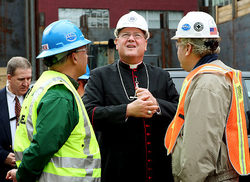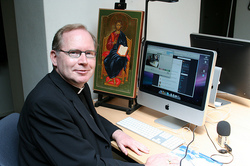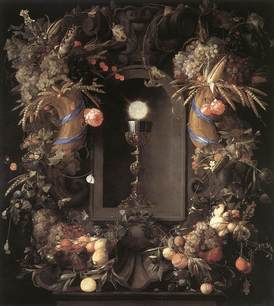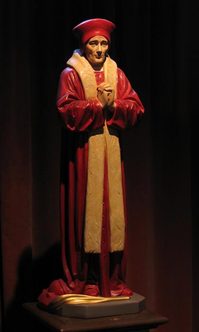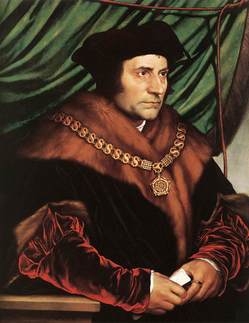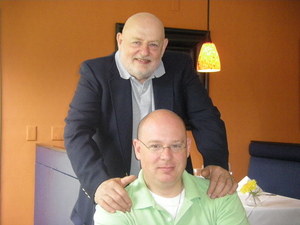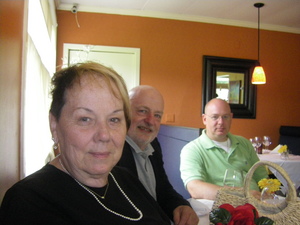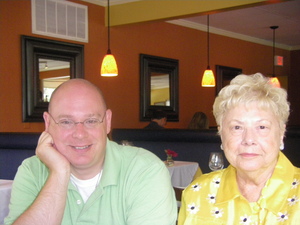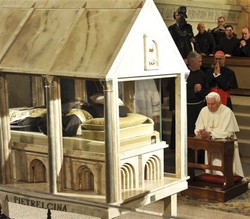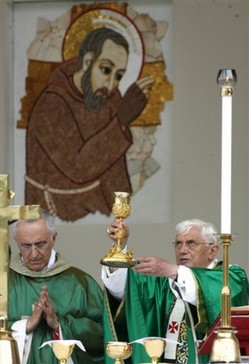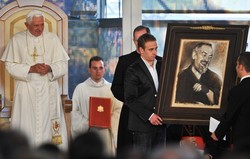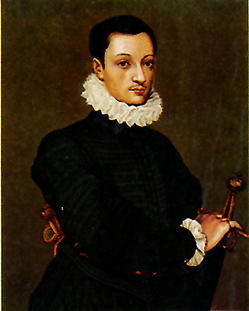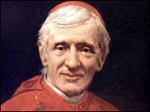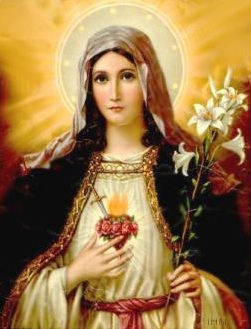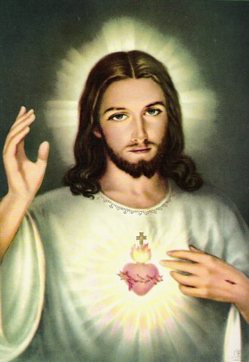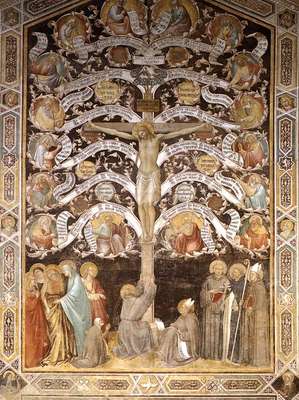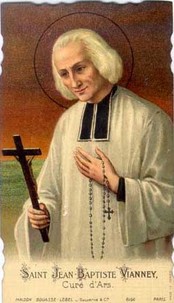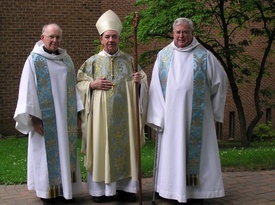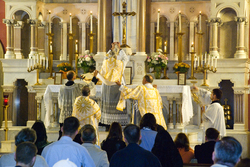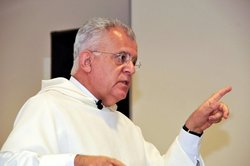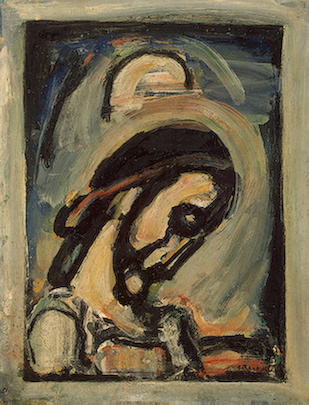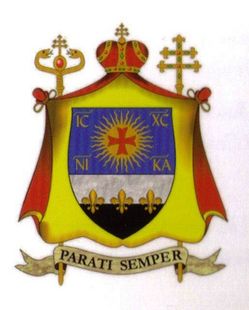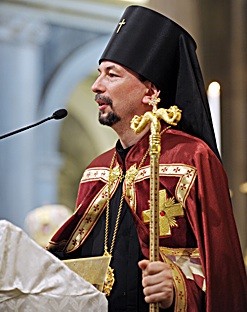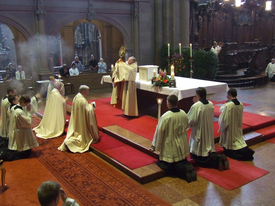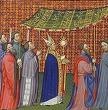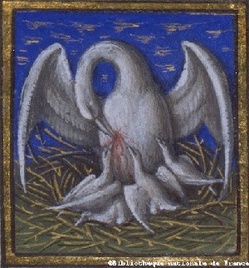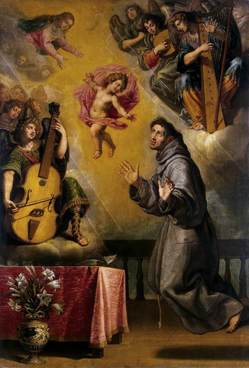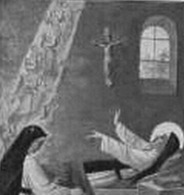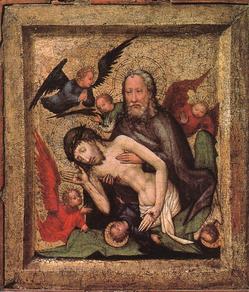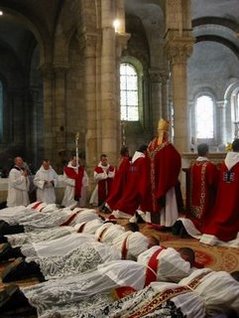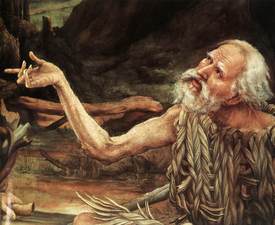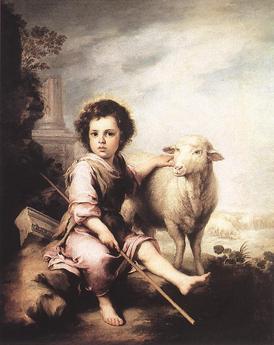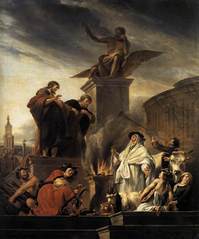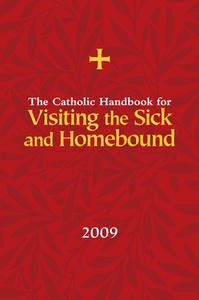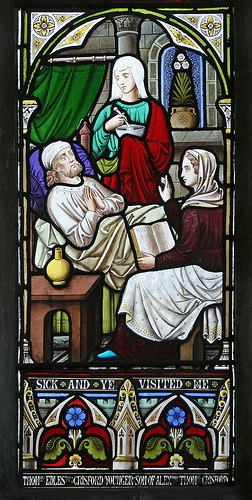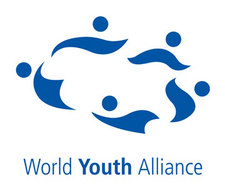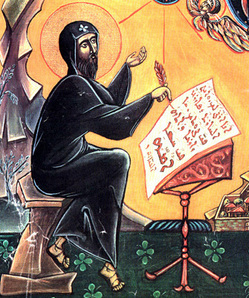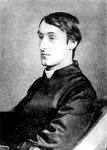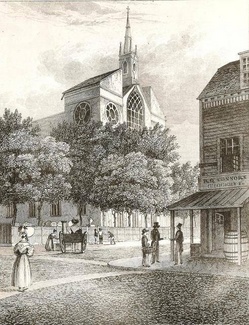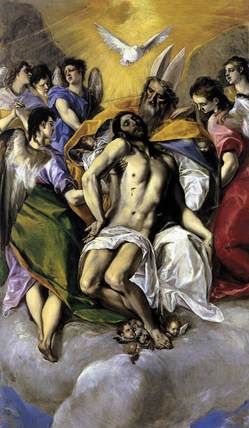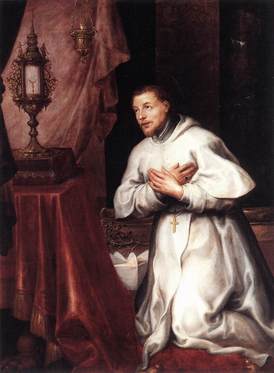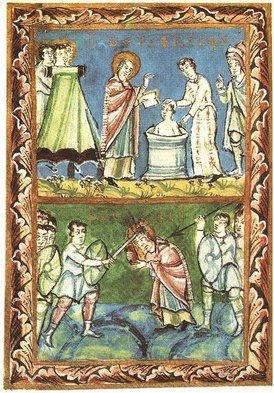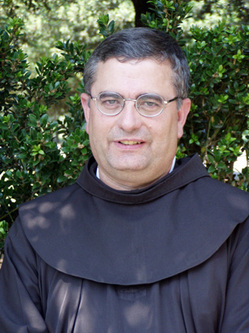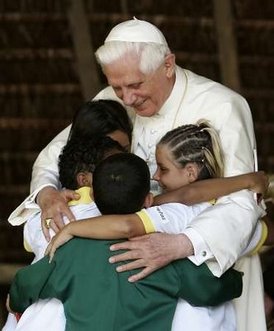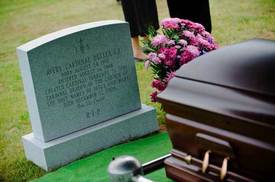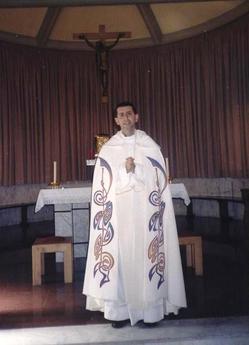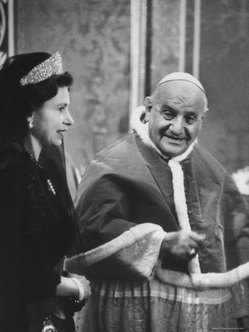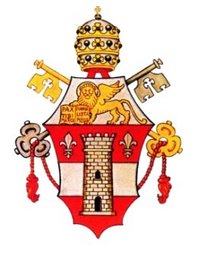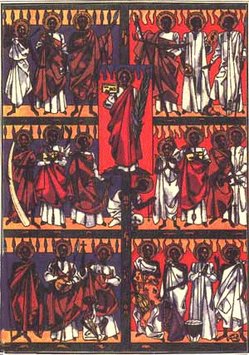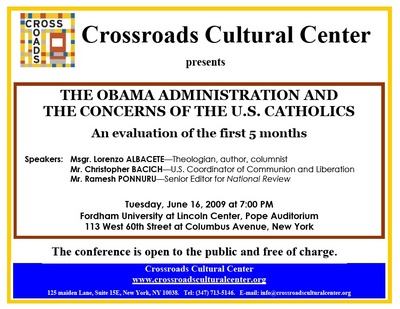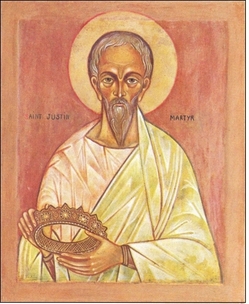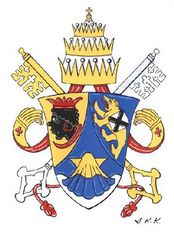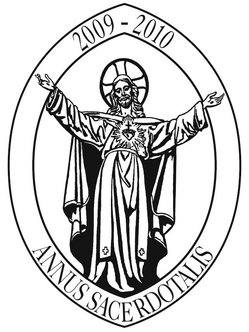
On the forthcoming Solemnity of the Most Sacred Heart of
Jesus, Friday 19 June 2009 - a day traditionally devoted to prayer for the
sanctification of the clergy -, I have decided to inaugurate a "Year for
Priests" in celebration of the 150th anniversary of the "dies
natalis" of John Mary Vianney, the patron saint of parish priests
worldwide.(1) This Year, meant to deepen the commitment of all priests to
interior renewal for the sake of a more forceful and incisive witness to the
Gospel in today's world, will conclude on the same Solemnity in 2010. The
priesthood is the love of the heart of Jesus", the saintly Curé of Ars
would often say.(2) This touching expression makes us reflect, first of all, with
heartfelt gratitude on the immense gift which priests represent, not only for
the Church, but also for humanity itself. I think of all those priests who
quietly present Christ's words and actions each day to the faithful and to the
whole world, striving to be one with the Lord in their thoughts and their will,
their sentiments and their style of life. How can I not pay tribute to their
apostolic labours, their tireless and hidden service, their universal charity?
And how can I not praise the courageous fidelity of so many priests who, even
amid difficulties and incomprehension, remain faithful to their vocation as
"friends of Christ", whom he has called by name, chosen and sent?
I still treasure the memory of the first parish priest at
whose side I exercised my ministry as a young priest: he left me an example of
unreserved devotion to his pastoral duties, even to meeting death in the act of
bringing viaticum to a gravely ill person. I also recall the countless
confreres whom I have met and continue to meet, not least in my pastoral visits
to different
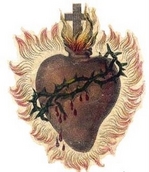
countries: men generously dedicated to the daily exercise of their
priestly ministry. Yet the expression of Saint John Mary also makes us think of
Christ's pierced Heart and the crown of thorns which surrounds it. I am also
led to think, therefore, of the countless situations of suffering endured by
many priests, either because they themselves share in the manifold human
experience of pain or because they encounter misunderstanding from the very
persons to whom they minister. How can we not also think of all those priests
who are offended in their dignity, obstructed in their mission and persecuted,
even at times to offering the supreme testimony of their own blood?
There are also, sad to say, situations which can never be
sufficiently deplored where the Church herself suffers as a consequence of
infidelity on the part of some of her ministers. Then it is the world which
finds grounds for scandal and rejection. What is most helpful to the Church in
such cases is not only a frank and complete acknowledgment of the weaknesses of
her ministers, but also a joyful and renewed realization of the greatness of
God's gift, embodied in the splendid example of generous pastors, religious
afire with love for God and for souls, and insightful, patient spiritual guides.
Here the teaching and example of Saint John Mary Vianney can serve as a
significant point of reference for us all. The Curé of Ars was quite humble,
yet as a priest he was conscious of being an immense gift to his people:
"A good shepherd, a pastor after God's heart, is the greatest treasure
which the good Lord can grant to a parish, and one of the most precious gifts
of divine mercy".(3) He spoke of the priesthood as if incapable of fathoming
the grandeur of the gift and task entrusted to a human creature: "O, how
great is the priest! ... If he realized what he is, he would die... God obeys him:
he utters a few words and the Lord descends from heaven at his voice, to be
contained within a small host...".(4) Explaining to his parishioners the
importance of the sacraments, he would say: "Without the Sacrament of Holy
Orders, we would not have the Lord. Who put him there in that tabernacle? The
priest. Who welcomed your soul at the beginning of your life? The priest. Who
feeds your soul and gives it strength for its journey? The priest. Who will
prepare it to appear before God, bathing it one last time in the blood of Jesus
Christ? The priest, always the priest. And if this soul should happen to die
[as a result of sin], who will raise it up, who will restore its calm and
peace? Again, the priest... After God, the priest is everything! ... Only in heaven
will he fully realize what he is".(5) These words, welling up from the
priestly heart of the holy pastor, might sound excessive. Yet they reveal the
high esteem in which he held the sacrament of the priesthood. He seemed
overwhelmed by a boundless sense of responsibility: "Were we to fully
realize what a priest is on earth, we would die: not of fright, but of love...
Without the priest, the passion and death of our Lord would be of no avail. It
is the priest who continues the work of redemption on earth... What use would be
a house filled with gold, were there no one to open its door? The priest holds
the key to the treasures of heaven: it is he who opens the door: he is the steward
of the good Lord; the administrator of his goods ... Leave a parish for twenty
years without a priest, and they will end by worshiping the beasts there ... The
priest is not a priest for himself, he is a priest for you".(6)
He arrived in Ars, a village of 230 souls, warned by his
Bishop beforehand that there he would find religious practice in a sorry state:
"There is little love of God in that parish; you will be the one to put it
there". As a result, he was deeply aware that he needed to go there to
embody
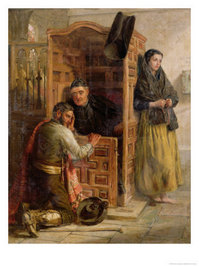
Christ's presence and to bear witness to his saving mercy: "[Lord,]
grant me the conversion of my parish; I am willing to suffer whatever you wish,
for my entire life!": with this prayer he entered upon his mission.(7) The
Curé devoted himself completely to his parish's conversion, setting before all
else the Christian education of the people in his care. Dear brother priests,
let us ask the Lord Jesus for the grace to learn for ourselves something of the
pastoral plan of Saint John Mary Vianney! The first thing we need to learn is
the complete identification of the man with his ministry. In Jesus, person and
mission tend to coincide: all Christ's saving activity was, and is, an
expression of his "filial consciousness" which from all eternity
stands before the Father in an attitude of loving submission to his will. In a
humble yet genuine way, every priest must aim for a similar identification.
Certainly this is not to forget that the efficacy of the ministry is
independent of the holiness of the minister; but neither can we overlook the
extraordinary fruitfulness of the encounter between the ministry's objective
holiness and the subjective holiness of the minister. The Curé of Ars
immediately set about this patient and humble task of harmonizing his life as a
minister with the holiness of the ministry he had received, by deciding to
"live", physically, in his parish church: As his first biographer
tells us: "Upon his arrival, he chose the church as his home. He entered
the church before dawn and did not leave it until after the evening Angelus.
There he was to be sought whenever needed".(8)
The pious excess of his devout biographer should not blind
us to the fact that the Curé also knew how to "live" actively within
the entire territory of his parish: he regularly visited the sick and families,
organized popular missions and patronal feasts, collected and managed funds for
his charitable and missionary works, embellished and furnished his parish
church, cared for the orphans and teachers of the "Providence" (an
institute he founded); provided for the education of children; founded
confraternities and enlisted lay persons to work at his side.
His example naturally leads me to point out that there are
sectors of cooperation which need to be opened ever more fully to the lay
faithful. Priests and laity together make up the one priestly people (9) and in
virtue of their ministry priests live in the midst of the lay faithful,
"that they may lead everyone to the unity of charity, 'loving one another
with mutual affection; and outdoing one another in sharing honour'" (Rom
12:10).(10) Here we ought to recall the Second Vatican Council's hearty
encouragement to priests "to be sincere in their appreciation and
promotion of the dignity of the laity and of the special role they have to play
in the Church's mission. ... They should be willing to listen to lay people, give
brotherly consideration to their wishes, and acknowledge their experience and
competence in the different fields of human activity. In this way they will be
able together with them to discern the signs of the times".(11)
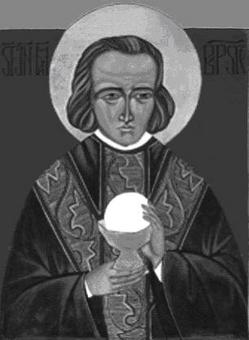
Saint John Mary Vianney taught his parishioners primarily by
the witness of his life. It was from his example that they learned to pray,
halting frequently before the tabernacle for a visit to Jesus in the Blessed
Sacrament.(12) "One need not say much to pray well" - the Curé
explained to them - "We know that Jesus is there in the tabernacle: let us
open our hearts to him, let us rejoice in his sacred presence. That is the best
prayer".13 And he would urge them: "Come to communion, my brothers
and sisters, come to Jesus. Come to live from him in order to live with him...(14) "Of course you are not worthy of him, but you need him!".(15) This way
of educating the faithful to the Eucharistic presence and to communion proved
most effective when they saw him celebrate the Holy Sacrifice of the Mass.
Those present said that "it was not possible to find a finer example of
worship... He gazed upon the Host with immense love".(16) "All good
works, taken together, do not equal the sacrifice of the Mass" - he would
say - "since they are human works, while the Holy Mass is the work of
God".(17) He was convinced that the fervour of a priest's life depended
entirely upon the Mass: "The reason why a priest is lax is that he does
not pay attention to the Mass! My God, how we ought to pity a priest who
celebrates as if he were engaged in something routine!".(18) He was
accustomed, when celebrating, also to offer his own life in sacrifice:
"What a good thing it is for a priest each morning to offer himself to God
in sacrifice!".(19)
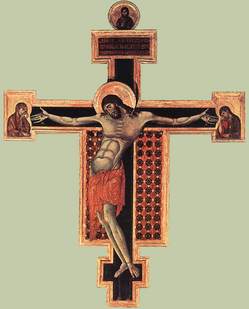
This deep personal identification with the Sacrifice of the
Cross led him - by a sole inward movement - from the altar to the confessional.
Priests ought never to be resigned to empty confessionals or the apparent
indifference of the faithful to this sacrament. In France, at the time of the
Curé of Ars, confession was no more easy or frequent than in our own day, since
the upheaval caused by the revolution had long inhibited the practice of
religion. Yet he sought in every way, by his preaching and his powers of
persuasion, to help his parishioners to rediscover the meaning and beauty of
the sacrament of Penance, presenting it as an inherent demand of the
Eucharistic presence. He thus created a "virtuous" circle. By
spending long hours in church before the tabernacle, he inspired the faithful
to imitate him by coming to visit Jesus with the knowledge that their parish
priest would be there, ready to listen and offer forgiveness. Later, the
growing numbers of penitents from all over France would keep him in the
confessional for up to sixteen hours a day. It was said that Ars had become
"a great hospital of souls".(20) His first biographer relates that
"the grace he obtained [for the conversion of sinners] was so powerful
that it would pursue them, not leaving them a moment of peace!".(21) The
saintly Curé reflected something of the same idea when he said: "It is not
the sinner who returns to God to beg his forgiveness, but God himself who runs
after the sinner and makes him return to him".(22) "This good Saviour
is so filled with love that he seeks us everywhere".(23)
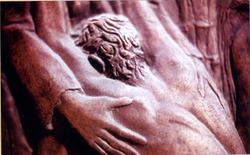
We priests should feel that the following words, which he
put on the lips of Christ, are meant for each of us personally: "I will
charge my ministers to proclaim to sinners that I am ever ready to welcome
them, that my mercy is infinite".(24) From Saint John Mary Vianney we can
learn to put our unfailing trust in the sacrament of Penance, to set it once
more at the centre of our pastoral concerns, and to take up the "dialogue of
salvation" which it entails. The Curé of Ars dealt with different
penitents in different ways. Those who came to his confessional drawn by a deep
and humble longing for God's forgiveness found in him the encouragement to
plunge into the "flood of divine mercy" which sweeps everything away
by its vehemence. If someone was troubled by the thought of his own frailty and
inconstancy, and fearful of sinning again, the Curé would unveil the mystery of
God's love in these beautiful and touching words: "The good Lord knows
everything. Even before you confess, he already knows that you will sin again,
yet he still forgives you. How great is the love of our God: he even forces
himself to forget the future, so that he can grant us his forgiveness!".(25) But to those who made a lukewarm and rather indifferent confession of sin, he
clearly demonstrated by his own tears of pain how "abominable" this
attitude was: "I weep because you don't weep",(26) he would say.
"If only the Lord were not so good! But he is so good! One would have to
be a brute to treat so good a Father this way!".(27) He awakened repentance
in the hearts of the lukewarm by forcing them to see God's own pain at their
sins reflected in the face of the priest who was their confessor. To those who,
on the other hand, came to him already desirous of and suited to a deeper
spiritual life, he flung open the abyss of God's love, explaining the untold
beauty of living in union with him and dwelling in his presence:
"Everything in God's sight, everything with God, everything to please God...
How beautiful it is!".(28) And he taught them to pray: "My God, grant
me the grace to love you as much as I possibly can".(29)
In his time the Curé of Ars was able to transform the hearts
and the lives of so many people because he enabled them to experience the
Lord's merciful love. Our own time urgently needs a similar proclamation and
witness to the truth of Love: Deus caritas est (1 Jn: 4:8). Thanks to the word
and the sacraments of Jesus, John Mary Vianney built up his flock, although he
often trembled from a conviction of his personal inadequacy, and desired more
than once to withdraw from the responsibilities of the parish ministry out of a
sense of his unworthiness. Nonetheless, with exemplary obedience he never
abandoned his post, consumed as he was by apostolic zeal for the salvation of
souls. He sought to remain completely faithful to his own vocation and mission
through the practice of an austere asceticism: "The great misfortune for
us parish priests - he lamented - is that our souls grow tepid"; meaning
by this that a pastor can grow dangerously inured to the state of sin or of
indifference in which so many of his flock are living.(30) He himself kept a
tight rein on his body, with vigils and fasts, lest it rebel against his priestly
soul. Nor did he avoid self-mortification for the good of the souls in his care
and as a help to expiating the many sins he heard in confession. To a priestly
confrere he explained: "I will tell you my recipe: I give sinners a small
penance and the rest I do in their place".(31) Aside from the actual
penances which the Curé of Ars practiced, the core of his teaching remains
valid for each of us: souls have been won at the price of Jesus' own blood, and
a priest cannot devote himself to their salvation if he refuses to share
personally in the "precious cost" of redemption.
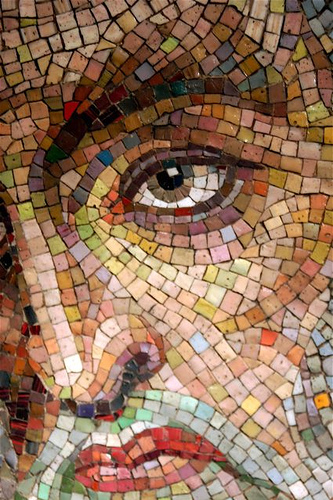
In today's world, as in the troubled times of the Curé of
Ars, the lives and activity of priests need to be distinguished by a forceful
witness to the Gospel. As Pope Paul VI rightly noted, "modern man listens
more willingly to witnesses than to teachers, and if he does listen to
teachers, it is because they are witnesses".(32) Lest we experience
existential emptiness and the effectiveness of our ministry be compromised, we
need to ask ourselves ever anew: "Are we truly pervaded by the word of
God? Is that word truly the nourishment we live by, even more than bread and
the things of this world? Do we really know that word? Do we love it? Are we
deeply engaged with this word to the point that it really leaves a mark on our
lives and shapes our thinking?".(33) Just as Jesus called the Twelve to be
with him (cf. Mk 3:14), and only later sent them forth to preach, so too in our
days priests are called to assimilate that "new style of life" which
was inaugurated by the Lord Jesus and taken up by the Apostles.(34)
It was complete commitment to this "new style of
life" which marked the priestly ministry of the Curé of Ars. Pope John
XXIII, in his Encyclical Letter Sacerdotii nostri primordia, published in 1959
on the first centenary of the death of Saint John Mary Vianney, presented his
asceticism with special reference to the "three evangelical counsels"
which the Pope considered necessary also for priests: "even though priests
are not bound to embrace these evangelical counsels by virtue of the clerical
state, these counsels nonetheless offer them, as they do all the faithful, the
surest road to the desired goal of Christian perfection".(35) The Curé of
Ars lived the "evangelical counsels" in a way suited to his priestly
state. His poverty was not the poverty of a religious or a monk, but that
proper to a priest: while managing much money (since well-to-do pilgrims
naturally took an interest in his charitable works), he realized that
everything had been donated to his church, his poor, his orphans, the girls of
his "Providence",(36) his families of modest means. Consequently, he
"was rich in giving to others and very poor for himself".(37) As he
would explain: "My secret is simple: give everything away; hold nothing
back".(38) When he lacked money, he would say aimiably to the poor who
knocked at his door: "Today I'm poor just like you, I'm one of you".(39) At the end of his life, he could say with absolute tranquillity: "I no
longer have anything. The good Lord can call me whenever he wants!".(40) His
chastity, too, was that demanded of a priest for his ministry. It could be said
that it was a chastity suited to one who must daily touch the Eucharist, who
contemplates it blissfully and with that same bliss offers it to his flock. It
was said of him that "he radiated chastity"; the faithful would see
this when he turned and gazed at the tabernacle with loving eyes".(41) Finally, Saint John Mary Vianney's obedience found full embodiment in his
conscientious fidelity to the daily demands of his ministry. We know how he was
tormented by the thought of his inadequacy for parish ministry and by a desire
to flee "in order to bewail his poor life, in solitude".(42) Only
obedience and a thirst for souls convinced him to remain at his post. As he
explained to himself and his flock: "There are no two good ways of serving
God. There is only one: serve him as he desires to be served".(43) He
considered this the golden rule for a life of obedience: "Do only what can
be offered to the good Lord".(44)
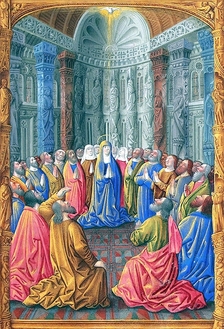
In this context of a spirituality nourished by the practice
of the evangelical counsels, I would like to invite all priests, during this
Year dedicated to them, to welcome the new springtime which the Spirit is now
bringing about in the Church, not least through the ecclesial movements and the
new communities. "In his gifts the Spirit is multifaceted... He breathes
where he wills. He does so unexpectedly, in unexpected places, and in ways
previously unheard of... but he also shows us that he works with a view to the
one body and in the unity of the one body".(45) In this regard, the
statement of the Decree Presbyterorum Ordinis continues to be timely:
"While testing the spirits to discover if they be of God, priests must
discover with faith, recognize with joy and foster diligently the many and
varied charismatic gifts of the laity, whether these be of a humble or more
exalted kind".(46) These gifts, which awaken in many people the desire for a
deeper spiritual life, can benefit not only the lay faithful but the clergy as
well. The communion between ordained and charismatic ministries can provide
"a helpful impulse to a renewed commitment by the Church in proclaiming
and bearing witness to the Gospel of hope and charity in every corner of the
world".47 I would also like to add, echoing the Apostolic Exhortation Pastores
Dabo Vobis of Pope John Paul II, that the ordained ministry has a radical "communitarian
form" and can be exercised only in the communion of priests with their
Bishop.(48) This communion between priests and their Bishop, grounded in the
sacrament of Holy Orders and made manifest in Eucharistic concelebration, needs
to be translated into various concrete expressions of an effective and
affective priestly fraternity.(49) Only thus will priests be able to live fully
the gift of celibacy and build thriving Christian communities in which the
miracles which accompanied the first preaching of the Gospel can be repeated.
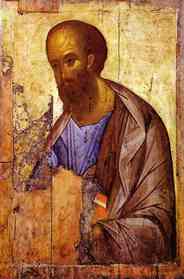
The Pauline Year now coming to its close invites us also to
look to the Apostle of the Gentiles, who represents a splendid example of a
priest entirely devoted to his ministry. "The love of Christ urges us
on" - he wrote - "because we are convinced that one has died for all;
therefore all have died" (2 Cor 5:14). And he adds: "He died for all,
so that those who live might live no longer for themselves, but for him who
died and was raised for them" (2 Cor 5:15). Could a finer programme could
be proposed to any priest resolved to advance along the path of Christian
perfection?
Dear brother priests, the celebration of the 150th
anniversary of the death of Saint John Mary Vianney (1859) follows upon the
celebration of the 150th anniversary of the apparitions of Lourdes (1858). In
1959 Blessed Pope John XXIII noted that "shortly before the Curé of Ars completed
his long and admirable life, the Immaculate Virgin appeared in another part of
France to an innocent and humble girl, and entrusted to her a message of prayer
and penance which continues, even a century later, to yield immense spiritual
fruits. The life of this holy priest whose centenary we are commemorating in a
real way anticipated the great supernatural truths taught to the seer of
Massabielle. He was greatly devoted to the Immaculate Conception of the Blessed
Virgin; in 1836 he had dedicated his parish church to Our Lady Conceived
without Sin and he greeted the dogmatic definition of this truth in 1854 with
deep faith and great joy."(50) The Curé would always remind his faithful
that "after giving us all he could, Jesus Christ wishes in addition to
bequeath us his most precious possession, his Blessed Mother".(51)
To the Most Holy Virgin I entrust this Year for Priests. I
ask her to awaken in the heart of every priest a generous and renewed
commitment to the ideal of complete self-oblation to Christ and the Church
which inspired the thoughts and actions of the saintly Curé of Ars. It was his
fervent prayer life and his impassioned love of Christ Crucified that enabled
John Mary Vianney to grow daily in his total self-oblation to God and the
Church. May his example lead all priests to offer that witness of unity with
their Bishop, with one another and with the lay faithful, which today, as ever,
is so necessary. Despite all the evil present in our world, the words which
Christ spoke to his Apostles in the Upper Room continue to inspire us: "In
the world you have tribulation; but take courage, I have overcome the
world" (Jn 16:33). Our faith in the Divine Master gives us the strength to
look to the future with confidence. Dear priests, Christ is counting on you. In
the footsteps of the Curé of Ars, let yourselves be enthralled by him. In this
way you too will be, for the world in our time, heralds of hope, reconciliation
and peace!

With my blessing,
From the Vatican, 16 June 2009.
BENEDICTUS PP. XVI
